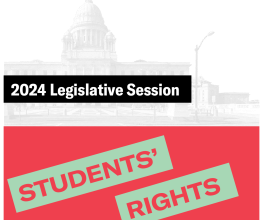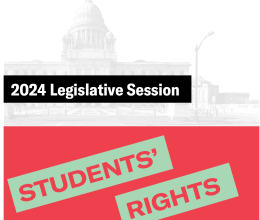The R.I. Supreme Court today dismissed as moot a lawsuit the ACLU filed in 2010, challenging various Truancy Court practices. In doing so, the Court acknowledged many of the constitutional claims the ACLU had raised, but ruled they were obviated when Family Court Chief Haiganush Bedrosian, after the suit was filed, issued an administrative order establishing various new rules for truancy court proceedings.
The ACLU’s lawsuit charged that the truancy courts were frequently punitive in nature, and that truancy court magistrates threatened vulnerable children and their parents with baseless fines and imprisonment, removed children from the custody of their parents without legal justification, and failed to keep adequate records of court hearings. The lawsuit also charged that the court system disproportionately impacts children who have difficulty attending school or doing their schoolwork because of special education or medical needs.
RI ACLU volunteer attorney Amy R. Tabor said today: “We are disappointed that the Court declined to review our ongoing concerns at this time, as we believe that continuing problems exist with the functioning of the truancy courts. We are reviewing the court’s decision to determine the most appropriate response. However, it is important to note that the decision clearly acknowledges that children facing truancy charges are entitled to basic constitutional rights, and that these rights must be respected and safeguarded. As we consider next steps, the ACLU will continue to monitor how school districts are using the truancy courts, how the truancy courts treat the children who are brought before them, and whether they do so in compliance with the administrative order.”
Among the provisions in the administrative order that the Court said addressed the constitutional concerns initially raised by the lawsuit are the following: at least 10 days of unexcused absences are required before a student can be referred to the truancy court; parents must be given an opportunity to provide a valid excuse for any absences; when a child or parent asks to have the case transferred to Family Court, the magistrate will honor this request without delay or retaliation; and there will be no more secret hearings, as all proceedings before magistrates will be recorded.
Finally, the Supreme Court rejected the Magistrates’ argument that it was acceptable for them to have private, ex parte communications with school officials about a child’s case, without the child or parent having any opportunity to hear what was being said about them. The Court made clear that such secret one-sided conversations violate the Code of Judicial Conduct.
The ACLU will be closely monitoring the truancy courts to ensure that magistrates fully comply with these mandates, and will also be reviewing the possibility of further legal action. In 2010, Superior Court Judge William Carnes refused to dismiss the ACLU lawsuit, leading to an appeal and today’s court ruling.








